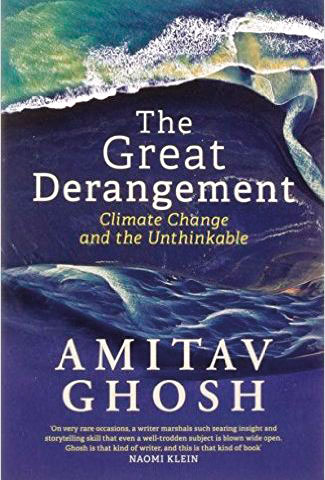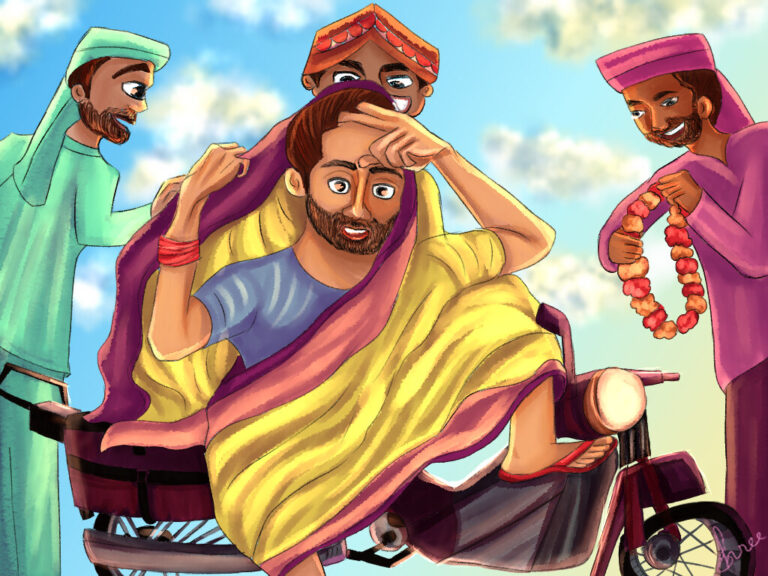Amitav Ghosh’s ‘The Great Derangement’ and Public Response to Covid-19
In the months following the emergence of the first known cases of the Covid-19 virus across several countries, the most common and immediate response observed in people was denial. Despite its rising numbers, a vast majority dismissed the virus as similar to one that caused the common flu, attributed Covid-19 deaths to undisclosed diseases and held authorities accountable for exaggerating the threat of the virus. As the government began to stress the importance of wearing masks and maintaining social distancing, people even began to deny the virus’ existence and suspected the complicity of the government in creating a hoax. Strangely, even the response of the educated and socially aware individuals had been similar. It was easier for people to surrender to the belief that there was no Covid-19 virus than confront the reality of a world in which there existed one.
Amitav Ghosh’s ‘The Great Derangement’ dabbles with this growing disbelief in unprecedented crises and examines the nuances of the literary and historical phenomenon that contributed in reinforcing it. While the issue addressed in the book is primarily climate change, it is commendable how acutely it delineates the reasons behind why the possibility of natural calamities isn’t taken seriously and questions the hesitation in modern fiction to accommodate such instances. In examining the inadequacy of literature to correctly assess and convey the violence of unpredictable natural crisis’, Ghosh traces the genealogy of the bourgeois novel and dismantles the belief that humans can exploit and co-exist with nature without facing its wrath.
In the book, Ghosh examines ‘the regularity of bourgeois life’: a mindset forged by the belief that life is composed of predictable events alone. Ghosh argues that contemporary fiction rarely engages with unpredictable events in nature so as to conform to the uniformitarian expectations of people and preclude the risk of seeming incredulous or ‘unrealistic’. He remarks that the problem seems to have begun when literature confined changes in nature to the ‘outhouses’ of ‘cli-fi’, ‘science fiction’ and the likes, leaving the impression that dynamic changes in nature could only signify intervention by ‘extraterrestrials’ or ‘interplanetary travel’. Ghosh posits that it is through these categorizations that themes concerning radical changes in nature are dissociated from mainstream literature, strengthening the disbelief in the suddenness of uncanny events.
The bourgeois novel’s excessive preoccupation with “individual moral adventure”, as phrased by Updike, made the narrative unfold through the character’s personal growth and knowledge acquisition. Additionally, the elaborate depictions of domestic settings drew the novel’s focus away from the exterior landscape. In this way, the reader’s mind was made attuned to situations where human beings could exercise control and decide the course of their life. This mindset was solidified by the perception, emerging with the industrial revolution, that nature could be tamed. To achieve relevance, as the novel drew closer to everyday life, it pushed back and confined instances of non-everyday events such as natural crises to the periphery, diminishing their frequency and predominance in the literary realm.
In his book, Ghosh asserts that this mindset severely affected how we perceived and engaged with natural catastrophes. As a result, whatever fell outside the spectrum of probability was met with elimination as our minds weren’t trained at receiving and acknowledging implausible events in nature readily. This analysis is crucial to understanding the role played by fiction in shaping the way we respond to any crisis. The eradication of the irregular and extraordinary changes in nature from the works of literature contributed to the creation of a narrative that insisted on the tenacity of only the normal and predictable developments in the world.
At the turn of the 20th century, Ghosh explains, modern prose came to be dominated by detailed descriptions of everyday life commonly known as ‘fillers’. According to the Italian historian Franco Moretti, fillers served the purpose of rationalizing the novelistic universe and turning it into a world of few surprises, fewer adventures, and no miracles. Moretti explained the popularity of fillers by highlighting that they offered the kind of narrative pleasure compatible with the new regularity of bourgeois life. In this way, by becoming exclusively concerned with the mundane and generic details of everyday life, fiction was evolving in a way that reinforced and revolved around plausible events alone. The regularity of bourgeois life was also influenced by the ‘gradualist’ theory of Nature proposed by James Hutton which discounted sudden leaps and fractures in nature and insisted that any variation in nature will always be gradual.
In between the big narrative turning points, the bourgeois novel stuffed in more and more filler. The augmenting use of fillers, present in Defoe reached its apogee in Flaubert. With the increase in objectivity, descriptions in the novel became analytic rather than romantic. Moretti proclaims “Its effect was to inscribe the present so deeply into the past that alternatives became simply unimaginable”. In this way, through the increased use of fillers, the bourgeois novel was creating a readership that saw only the predictable events as plausible. The readers’ mind was being conditioned to recognize only the ordinary and heard-of phenomenon as likely and acceptable.
When Max Weber introduced his concept of rationalization, he explained how modern society has become increasingly concerned with the desire to predict what will happen in the future. Further, he emphasized that “instrumental reason” has become a key characteristic of bourgeois culture. His theory asserted that predictability has arrived at the forefront of every discussion and therefore, anything that seems highly unpredictable or unlikely has become increasingly prone to getting dismissed.
As fiction evolved in a way that accorded more value to rationalizing things, all spontaneous and unlikely events in books were either not taken seriously or confined to the imaginative realms of the writer’s mind. The popularity of realism combined with the increase in literacy during the mid-20th century catalyzed the consumption of modern literature and contributed to the creation of ‘the regularity of bourgeois life’. The narrative of modern novels was deliberately created in a way that either completely left out the improbable events or presented them in a way that was normal or palatable for the audience.
While contemporary literature exercises no restraint in depicting the possibility of unlikely events transpiring, the belief in the persistence of the ‘normal’ has survived the test of times. In the last few decades, even books on apocalyptic themes have only marginally succeeded in overcoming the belief in the normal, instead, they have enhanced the dissociation between reality and fiction and confined instances of severe natural crisis exclusively to the realm of the latter. As a result, many people have trouble coming to terms with a reality that is a far cry from not only their immediate but also long-term predictions. Hence, upon confrontation with a future different from what one had envisioned, the most commonly observed response turns out to be disorientation and denial.
The arrival of contagious viruses is not an unseen spectacle. In the past century, there have been numerous highly contagious and virulent viruses. However, the scale at which the covid-19 virus circumscribed the world and reached every district and city in a short period was not only unparalleled but also frightening. While reasons like fear, lack of awareness, and distrust in the governing authorities were dominant behind the denial behavior exhibited by people, it is not wrong to say that the inveterate ‘regularity of bourgeois life’ and belief in the predictability of changes in nature also contributed to the appalling disbelief with which countless people reacted to the Covid-19 crisis. Through Ghosh’s astute observations, it becomes apparent that the role of fiction in forging mindsets and determining our response to any kind of preternatural crisis is highly significant.
References
- Ghosh, A. (2017). The Great Derangement. University of Chicago Press.
- Hutton, J. (1788). Theory of the Earth. Trans. R. Soc. Edinburgh, 1,








